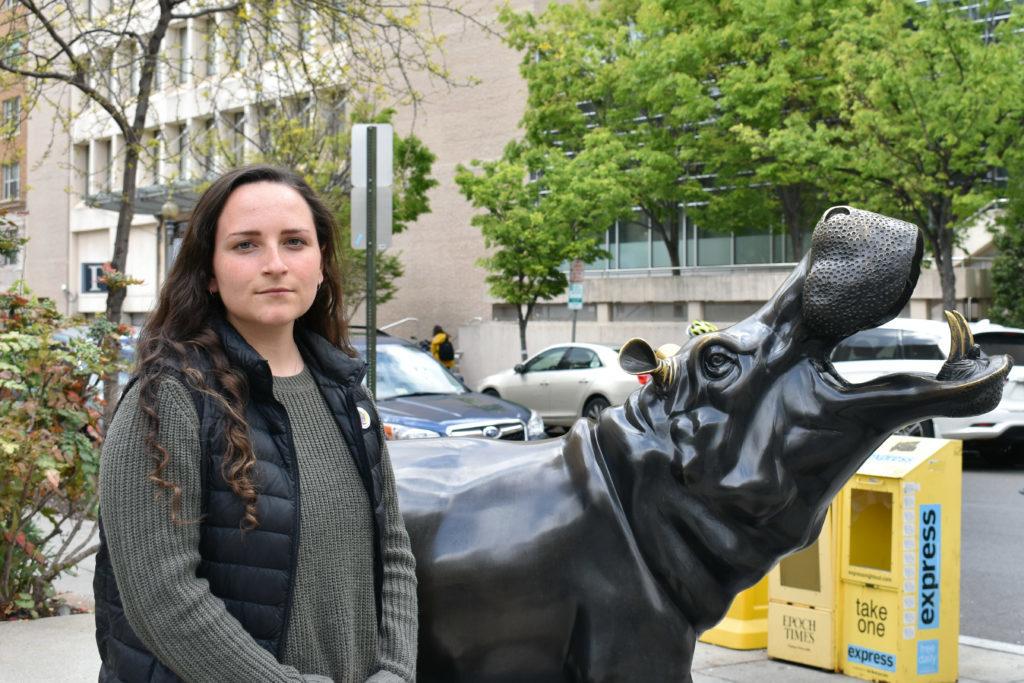Students are calling for the University to discard its 92-year-old mascot for a less “offensive” mascot.
Three students launched a petition last week calling on the University to change its mascot from the Colonial to the hippo. Students who signed the petition said the Colonial figure hurts GW’s reputation and is offensive to international students who have experienced the effects of colonialism.
Sophomore Rachel Yakobashvili said she and two other students launched the first petition ever on the Student Association’s advocacy website GW Voice last week to encourage the University to consider new mascot options, like “Hippos,” “Revolutionaries” or “Riverhorses.” More than 200 students have signed onto the petition as of Wednesday, and if the petition hits 500 signatures, SA leadership will be required to respond.
“It’s hard to have school pride when the thing that you have to be prideful for is so offensive,” Yakobashvili said.
She said she understands that it’s expensive to change all campus branding when making the switch, but said it’s necessary to make GW inclusive. She said the organizers haven’t heard any pushback from students who want the Colonial mascot to stay.
“It’s hard to have school pride when the thing that you have to be prideful for is so offensive.”
Sophomore Andrew Hesbacher, a former Hatchet reporter who helped launch the petition, said he, Yakobashvili and junior Emma Krasnopoler were at a study abroad orientation in April when study abroad staff told them they should not wear any clothing with “Colonials” on it in any country outside of Europe because citizens of those countries would be offended by the history of the word.
“It’s very wrong for us to call ourselves an open and welcoming university when the name means such demise and terror for students who could possibly come here,” he said.
The hippo has been GW’s unofficial mascot for years since former University President Stephen Joel Trachtenberg brought the statue to campus in 2000.
Hesbacher said because of the hippo’s long-standing history at GW, it wouldn’t be a stretch to change the mascot, and students have been talking about changing the mascot for years. But he said it was time to make the change a focus instead of a “side conversation.”
“Colonialist, terrorist, murderer. In a lot of places that’s what colonials mean to people,” Hesbacher said. “Why would we continue to call ourselves that?”
The movement’s organizers said they want to wait until they have a demonstration of student support to bring the issue to administrators.
Junior Annabel LaBrecque, the co-president of GW Students for Indigenous and Native American Rights, said changing the mascot was a major goal of the organization when it launched last fall. LaBrecque said there has been no centralized effort to change the mascot until now.
LaBrecque said she has spoken to students and faculty who have agreed the mascot is offensive to students, and she signed the petition on behalf of SINAR.
“The indigenous communities and their allies here just don’t feel welcomed,” she said.
Sen. Jan Yonan, CCAS-U, helped host the University’s first-ever “Hippo Day” – an SA-hosted event with hippo stickers and games – in February and said he hopes the petition will educate students about the impact of colonialism in the United States and around the world.
“It is one step to amass the clear emotion that most GW students feel – we may feel like GW students, we may even be proud to be here, but we are not proud to be ‘Colonials,'” he said.
“The indigenous communities and their allies here just don’t feel welcomed.”
Elyssa Clauson, a senior and an orientation leader for exchange students, who signed the petition, said during student exchange orientation training, staff members tell student leaders to take time during the orientation to explain that the mascot represents the first settlers of the United States and isn’t meant to be offensive.
“They just kind of laugh at it like, ‘why is this your mascot, it’s kind of stupid,’” she said.
She said as a public health major who hopes to get into a career in global health, she wants to be able to go to developing nations that have had problems with colonialism and still be able to represent her school.
“I’ve gone to GW for four years and I love it here, and I love our student body, and I love how passionate everyone is and I want to be able to proudly represent our school in the international community,” Clauson said.





